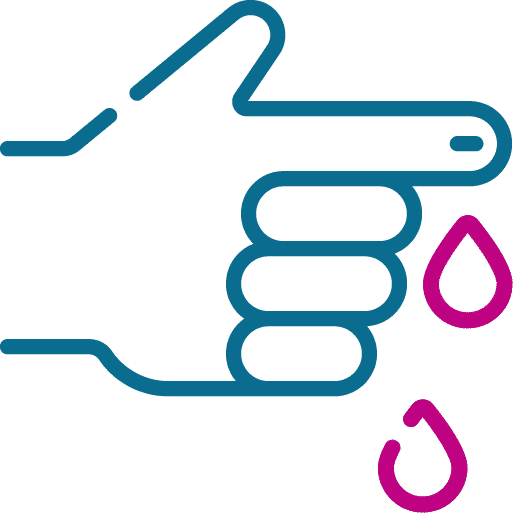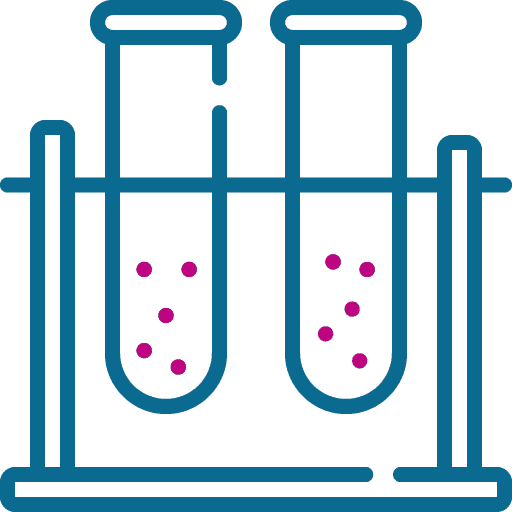Blood tests at your home
Can’t or don’t you want to take blood tests at the polyclinic? Take advantage of the new “Telesante” service – collect blood yourself according to the provided instructions and send it to us via Omniva postal machines! The service is provided throughout Lithuania.
Examples of service prices
8,00 EUR
General blood test
47,40 EUR
Primary program for women
With this service we will provide
We will save your time
The right time and place for you
You won't have to go anywhere
Help by phone
How does it work?
Order a service
Select the blood tests you want to do.
Fill in the details
Fill in your details and specify the exact delivery address.
Pay for the service
Pay for the blood tests you choose.
Wait for the call
Telesante specialists will contact you and inform you what to do next.
You will not need to go to a laboratory or clinic. You will do everything yourself at home according to the instructions provided.
| Name | Summary | Price | Buy | hf:tax:product_tag | |
|---|---|---|---|---|---|
| Alanine aminotransferase (ALAT, GPT) | When your doctor suspects liver damage. Patients with general weakness, fatigue, loss of appetite, nausea and/or vomiting, ascites and/or abdominal pain, yellowing of the skin and mucous membranes (jaundice), darkening of the urine, altered stools, itchy skin. | 5,00 € | biochemical-tests | ||
| Albumin | The test is carried out in cases of suspected liver impairment, kidney disease, or in people with significant changes in body weight, as well as before elective surgery. | 5,00 € | biochemical-tests | ||
| Alkaline phosphatase | It is an indicator of bone and liver pathology. Important to note: sometimes an increase in this enzyme can be due to the patient’s blood being tested after a meal. | 5,00 € | biochemical-tests | ||
| Antistreptolysin-O (ASO) | Streptococcus bacteria are the most common cause of sore throats, tooth abscesses and skin infections such as rosacea. It can also damage joints, heart and kidneys. | 15,00 € | biochemical-tests | ||
| Aspartate aminotransferase (ASAT, GOT) | Investigation of liver damage. It is often ordered together with an alanine aminotransferase (ALT) test for the diagnosis or evaluation of liver disease. AST and ALT are considered the two most important tests for detecting liver damage. | 5,00 € | biochemical-tests | ||
| C-reactive protein (CRB) | The C-reactive protein (CRB) test is used to detect inflammation when tissue damage or inflammation caused by infection is suspected. | 8,50 € | biochemical-tests | ||
| Cancer marker CA 125 (ovarian) | It is used to diagnose and monitor the effectiveness of treatment in ovarian cancer. | 17,00 € | cancer-marker-tests | ||
| Cancer marker CA 15-3 (breast) | It is used to diagnose and monitor the effectiveness of treatment in breast cancer. | 17,00 € | cancer-marker-tests | ||
| Cancer marker CA 19-9 (pancreatic) | CA 19-9 has a clinical sensitivity of 70-80% for pancreatic cancer. Evaluated together with CEA as a secondary marker for gallbladder, colon and stomach cancer; for liver metastases. | 17,00 € | cancer-marker-tests | ||
| Cancer marker CA 72-4 (stomach) | The best laboratory indicator for gastric cancer. Blood levels of the indicator are monitored to track the progress of gastric cancer | 22,00 € | cancer-marker-tests | ||
| Chlorine | Chlorine concentrations decrease with excessive fluid intake, prolonged vomiting, adrenal pathology, heart and kidney failure. | 7,00 € | biochemical-tests | ||
| Cholesterol | For adults, it is recommended to have a cholesterol test every five years. | 4,50 € | biochemical-tests | ||
| Chorionic gonadotropin (HCG) | Chorionic gonadotropin is the main laboratory test for normal pregnancy. It can also be used as a marker for cancer. | 17,00 € | hormone-tests | ||
| Creatinine | The test is used to assess kidney function and to monitor the treatment of kidney disease. | 5,00 € | biochemical-tests | ||
| Cytomegalovirus (CMV) IgG | Chronic infection with cytomegalovirus or a history of contact with the causative agent. CMV IgG can be detected 7-14 days after infection. | 16,00 € | markers-of-infectious-diseases | ||
| Cytomegalovirus (CMV) IgM | Cytomegalovirus infection is detected during the acute period. CMV IgMs appear in the blood as early as 3-4 days after the start of infection and persist for several months (after which they degrade). | 16,00 € | markers-of-infectious-diseases | ||
| EBV (Epstein-Barr virus) IgG | Infectious mononucleosis is an acute viral infection characterised by fever, sore throat and enlarged lymph nodes. The source of infection is people with acute or chronic infectious mononucleosis, as well as healthy carriers. | 17,00 € | markers-of-infectious-diseases | ||
| EBV (Epstein-Barr virus) IgG | The test indicates a history of contact, active infection or viral relapse. | 17,00 € | markers-of-infectious-diseases | ||
| EBV (Epstein-Barr virus) IgM | The study shows an acute infection of infectious mononucleosis caused by Epstein-Barr virus. The increase in IgM antibodies to EBV capsid antigen (Epstein barr) disappears within 4-6 weeks. | 17,00 € | markers-of-infectious-diseases | ||
| Ercococcal encephalitis IgG | The IgG antibody test for tick-borne encephalitis is administered 3-4 weeks after the injection to determine the course of the chronic disease or to assess a pre-existing infection. | 15,00 € | markers-of-infectious-diseases | ||
| Ercococcal encephalitis IgM | Tick-borne encephalitis is a dangerous infectious disease spread by ticks. Unpasteurised milk can also cause infection. | 15,00 € | markers-of-infectious-diseases | ||
| Ferritin | Ferritin is an acute-phase protein, which means that its levels increase in people with inflammatory diseases, liver diseases, chronic infections, autoimmune diseases and certain cancers, and in people with alcohol abuse. | 14,00 € | biochemical-tests | ||
| Gammaglutamyltransferase (GGT) | One of the most sensitive indicators of cholestatic liver syndrome, alcoholic and toxic liver injury, and liver metastases, with an increase that can become apparent early in the disease. | 5,00 € | biochemical-tests | ||
| Glucose | The test is needed to monitor people for diabetes mellitus, elevated glucose levels (hyperglycaemia) or reduced glucose levels (hypoglycaemia). | 4,00 € | biochemical-tests | ||
| HDL cholesterol | HDL cholesterol testing is used to properly assess the risk of cardiovascular disease. | 5,00 € | biochemical-tests | ||
| Helicobacter pylori IgA | It allows you to identify whether a person is infected with H. pylori, as well as those with signs and symptoms of gastrointestinal disease and asymptomatic individuals. | 17,00 € | markers-of-infectious-diseases | ||
| Helicobacter pylori IgG | Helicobacter pylori IgG antibodies – a serological blood test that shows specific IgG antibodies against Helicobacter pylori. Helicobacter pylori causes diseases of the stomach and duodenum, such as erosion, ulcers and chronic gastritis. Positive IgG results indicate that the person has been infected or is currently infected with an active form of Helicobacter pylori infection. Helicobacter pylori IgG antibody testing is required if you have problems with indigestion, fullness/heaviness after eating, bloating or heartburn. Helicobacter pylori is a microorganism found in the stomach. This bacterium is special because, unlike many others, it is adapted to living in acidic environments. According to the WHO, the majority of the human population (30-40%) carries this bacterium in their stomach lining. It has been observed that people without this bacterium are less likely to suffer from gastrointestinal diseases such as erosions, ulcers and chronic active gastritis. Sufferers have a “burning” stomach after eating, irritation and straining. In this context, people with ulcers are often advised to eradicate the Helicobacter pylori bacteria in the body so that they no longer irritate it. Depending on their activity and quantity, these bacteria interfere with sleep quality, cause bad breath and promote the formation of cancer cells. In addition to Helicobacter pylori bacteria, gastric diseases are also influenced by factors such as genotype, stress, smoking, coffee, alcohol, use of anti-inflammatory drugs (orally) and poor dietary habits. Often people with stomach problems like to eat before going to bed, which they should not do. Overeating or prolonged fasting and skipping breakfast are also common. Your diet should be regular throughout the day. If you have stomach problems, you should avoid dairy products, citrus fruits, chocolate, fizzy drinks, and start a cycle of stomach calming drugs or, alternatively, take therapeutic licorice teas. There are several ways to detect the bacterium:– Serological blood tests Inflammation and damage to the stomach lining caused by the bacteria are manifested by abdominal pain, indigestion, bloating, and a feeling of heaviness after eating. A serological blood test detects specific IgG antibodies against Helicobacter pylori. A positive test result indicates that the person has had an infection or is infected with an active form of Helicobacter pylori infection. IgA and IgM antibody tests are recommended to increase the reliability and specificity of the test. You can consult our family doctors. | 17,00 € | markers-of-infectious-diseases | ||
| LDL (β) cholesterol | LDL cholesterol testing is used to properly assess the risk of cardiovascular disease. | 6,50 € | biochemical-tests | ||
| Luteinising hormone (LH) | If your periods are irregular, blood tests are carried out daily, starting on the 8th day before the expected start of your period. Determining the maximum concentration allows you to assess the best time of day to get pregnant. | 13,00 € | hormone-tests | ||
| Lyme disease IgG antibodies | The later stages of Lyme disease and chronic disease are indicated by IgG antibodies, which start circulating in the blood 4-6 weeks after the infected tick bites. Elevated levels of these antibodies can persist for more than a year after contracting Lyme disease. | 13,00 € | markers-of-infectious-diseases | ||
| Lyme disease IgM antibodies | Lyme disease (borreliosis) is a dangerous infectious disease spread by ticks. | 13,00 € | markers-of-infectious-diseases | ||
| Magnesium | The test is used to determine the magnesium level in the blood, to assess the severity of kidney disease or uncontrolled diabetes, to diagnose gastrointestinal disorders, and to evaluate the causes of changes in calcium, potassium, phosphorus and parathyroid hormone (PTH). | 5,00 € | biochemical-tests | ||
| Mycoplasma pneumoniae IgG | To detect chronic infection caused by Mycoplasma pneumoniae or previous contact with the causative agent. Mycoplasma pneumoniae IgG titre rises later, after 3-4 weeks. | 17,00 € | markers-of-infectious-diseases | ||
| Mycoplasma pneumoniae IgM | For the diagnosis of acute infection caused by Mycoplasma pneumoniae. Mycoplasma pneumoniae serum primary M-class antibody (IgM) titres rise after approximately 2 weeks. from the time of infection or even later, and disappears within about a year. | 17,00 € | markers-of-infectious-diseases | ||
| Natris | Sodium levels should be monitored for kidney disease, acute inflammation, tumours, diuretics (urinary stimulants), heart failure, vomiting or diarrhoea. | 5,00 € | biochemical-tests | ||
| Progesterone (PG) | Blood levels of progesterone are used to confirm that the body is ovulating. The progesterone test at various intervals can help to determine the exact day of ovulation. | 13,60 € | hormone-tests | ||
| Prolactin (PRL) | Prolactin testing is needed to diagnose a tumour of the pituitary gland called prolactinoma, and after a diagnosis of prolactinoma, to monitor the treatment of the disease and to assess whether the treatment is effective. | 20,00 € | hormone-tests | ||
| Prostate specific antigen (PSA) | The most important test is to diagnose the prostate carriage and monitor treatment. It is also used for preventive screening of men over 30 years of age for the early diagnosis of prostate cancer. | 12,00 € | cancer-marker-tests | ||
| Rheumatoid factor (RF) - quantitative test | A convenient test to assess the diagnosis, prognosis and course of joint diseases. | 12,00 € | biochemical-tests | ||
| Testosterone | Testosterone levels in women’s bodies may indicate the development of certain tumours. It may be reduced in cirrhosis, when treated with oestrogens, and in marked obesity. | 15,00 € | hormone-tests | ||
| Thyrotropin (TTH, TSH) | The thyrotropin test is needed for screening and diagnosis of thyroid diseases (it is the most sensitive indicator of thyroid dysfunction), for monitoring the treatment of hypothyroidism and hyperthyroidism, and for investigating the causes of female infertility. | 9,50 € | hormone-tests | ||
| Thyroxine (T4) | A hormone produced by the thyroid gland. The free thyroxine test is much more accurate. Two parameters (TTH and FT4) are very important in differentiating between thyroid diseases. | 17,00 € | hormone-tests | ||
| Tick-borne encephalitis IgG (post-vaccination evaluation) | This test shows whether the patient has sufficient immunity to tick-borne encephalitis and when re-vaccination is needed. | 30,00 € | markers-of-infectious-diseases | ||
| Total calcium | It is performed on people suffering from kidney, bone, heart, nervous system and dental diseases. | 5,00 € | biochemical-tests | ||
| Triglycerides | Triacylglycerol testing is used to properly assess the risk of cardiovascular disease. | 4,50 € | biochemical-tests | ||
| Triiodothyronine (T3) | It is a thyroid hormone produced in the tissues from thyroxine. Testing for free triiodothyronine is more accurate than total triiodothyronine. It is prescribed when thyroid disease is suspected. | 19,00 € | hormone-tests | ||
| Urea | It is used to assess kidney function and is more reflective of total kidney function. | 5,00 € | biochemical-tests | ||
| Uric acid | Used to diagnose gout. Elevated levels are found in kidney disease. | 5,50 € | biochemical-tests | ||
| Vitamin B12 | Vitamin B12 deficiency is associated with weakness, fatigue, mobility problems, joint pain, mouth ulcers, mood swings, impaired vision and memory, and in severe cases, depression. | 24,00 € | other-immunoenzymatic-tests | ||
| Vitamin D | The test is used to diagnose vitamin D deficiency or excess, and to assess whether abnormalities in laboratory tests reflecting calcium metabolism (calcium, phosphorus, parathyroid hormone (PTH)) are due to vitamin D deficiency or excess. | 18,00 € | other-immunoenzymatic-tests | ||
| α - amylase | To diagnose pancreatitis or other pancreatic diseases. | 8,50 € | biochemical-tests | ||
| α-fetoprotein (AFP) | This indicator is used to investigate two groups of pathologies: 1.cancers; 2.foetal malformations. | 15,00 € | cancer-marker-tests | ||
| Complete blood count (CBC) | A CBC is a selective automated blood test that provides information on all blood cells (erythrocytes, leucocytes, platelets) and the size distribution of cells. | 8,00 € | general-research | ||
| Determination of blood group and rhesus factor | A person has a blood type: 0, A, B, AB and Rh positive or negative. Knowing your blood type is essential for blood transfusions, and should be determined before surgery and when obtaining a driving licence. | 10,00 € | general-research |
Sign up for blood tests
Trust us and stop worrying! We are medical professionals who have been working with patients for many years, so we promise that the consultation will be useful for you.






